|
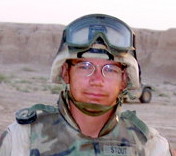
|
Robert
Stout
President,
BRAVER
Buckeye Region American Veterans For Equal
Rights
an ordinary hero
by
Denny
Meyer |
Sgt
Robert Stout has a lot of integrity under his belt,
along with some shrapnel, for a young man of 26.
He will live the rest of his life with the evolving
result of having been injured by shrapnel from an RPG while on duty in Iraq,
from being awarded a Purple Heart for that wound, and
for having had the youthful idealism of personal
integrity to come Out nationally while on active duty
in the US Army. He's had his fifteen minutes of
fame, somewhat to his chagrin. Now, he is
dedicated to advocating the repeal of Don't Ask Don't
Tell so that other American patriots, like himself,
may serve our nation openly without
discrimination. He is leading a heartland
chapter of American Veterans For Equal Right (AVER) in
Columbus, Ohio.
Robert
Stout grew up on a two-hundred-acre farm along an
unpaved road in rural Utica, Ohio, which his family
has owned since before Ohio became a state in
1803. In this small American town in Licking
County, population 6,000, everyone knew everyone else;
his grandparents lived next door on the family farm;
his teachers went to school with his parents; and even
the cats, dogs, and pigs on the farm all knew each
other on a first name basis. He played clarinet
in his high school band, marching down Main Street
with siblings, cousins, and his Jack Russell Terrier
running alongside, on balmy autumn evenings when the
air was heavy with the sweet scent of new mown
hay. Robert could not wait to escape this
Heartland paradise as fast as he could, as soon as he
graduated from high school, by joining the Army.
And yet, after years at war, having served in Kosovo
and nearly being blown to bits in Iraq, having led
troops on patrol, and having attained national fame by
telling the world that he is gay, he could not wait to
go back home to his hearth in Licking County,
Ohio. It takes a special kind of courage to do
all that he has done, particularly going back to
rural America to take up the banner for our rights.
Robert's
reasons for joining the Army had a lot to do with
pride and tradition. His brother and father had
served and he sincerely wanted to do his part to serve
his country. He is proud to be an American and
an Ohioan. "Ohio led the nation in civil
rights and integration of schools; it was the
manufacturing base of America, and was the home of
more presidents than any other state after
Virginia, he told me.
"Did
you know you were gay when you joined?" I
asked. He did.
"What
were you thinking?" I wanted to know. In
'00 when he signed up, the DADT policy was read to
him, he told me. As he saw it, where he came
from he was in the closet anyway. "I can
handle that," He thought. "I'll see the
world, get job training and experience to last a
lifetime!" He put being gay aside in his
mind, and signed the paper. Indeed, as many have
before him, he had experiences that would last a
lifetime.
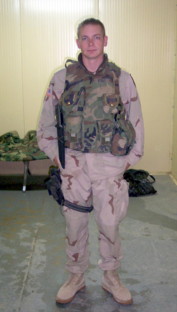 |
He
was trained as a Combat Engineer, planting and
removing mines, laying and removing concertina
barbed wire, and learned to drive an armored
personnel carrier. He had his integrity
from the start; beginning at his first duty
station, he let peers know that he was gay; no
one cared. And yet, the foul breath of
bigotry blew from above, where officers were
heard referring to subordinates as
"faggots." Considering such
unsophisticated command, the reason this young
leader was not permitted to reenlist becomes
clear.
In
Kosovo, Stout was a night-shift RTO (radio telephone
operator) a position of vital responsibility
coordinating patrol and other units to prevent
friendly fire, and acting as the calm conduit between
command and field units when situations arise.
As
preparations for OIF began, he was selected to
accompany and assist flag officers, from his 1st
Infantry Div. base in Germany, to Turkey. |
In
the winter of '04 he was stop-lossed. In March
of 2004, on his 22nd birthday, he was changing the
transmission on a Humvee in the desert in Kuwait,
preparing to drive north to Baghdad. Shortly
thereafter he was among explosives engineers assigned
to an airborne Calvary squadron of Apache helicopters
at a forward operating base between Ballad and Tikrit
where he lived in a leaky tent for four months, under
constant mortar fire. Their mission, as trained
explosives handlers, was to precede
convoys, and identify and explode IEDs.
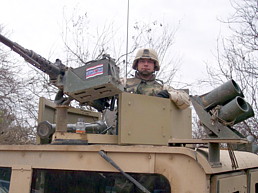 |
On
the evening of May 11, 2004, his unit got a routine
call; a truck had been spotted out in a field near the
base and it needed to be checked to see if it was
holding ordinance. They headed out, checked the
truck, and found it had simply been abandoned.
Heading back, at 11 PM, Stout was the gunner with a .50
caliber machine gun atop a Humvee, which was the last
vehicle in their convoy. Wearing night-vision
goggles, as they passed through a small town on a
farmers road, he scanned a mud brick wall and houses,
swinging the gun back and forth. Suddenly there
was a loud boom, his goggles went green with light and
he was briefly |
| blinded, and he was covered in
blood. He dropped down into the vehicle,
"We've been hit, we've been hit!" The squad
leader was shouting into the radio. Soldiers ran
back from the other vehicles, ready for ambush, and
began pulling Stout and the others from the Humvee.
An RPG had ht the rear quarter panel by the door; the
vehicle had absorbed a lot of the explosion, but
Robert Stout got shrapnel in his left arm, legs, and
face, more than 20 pieces of hot metal had pierced
his body. Some remain to this day. |
He
was rushed to the base aid station, bandaged and
drugged, and then medevaced to the Army hospital in
Balad. All five in his vehicle were injured, the
worst was his squad leader who had taken shrapnel in
his eye.
| Robert
had gotten the most shrapnel and was shipped to
Germany for a month to recover. He was put up
for promotion. By June of '04 he was back in
Iraq, again a gunner atop a Humvee. In August he was promoted to Corporal and became a team
leader. Within months he was a Sergeant, in
charge of convoys doing munitions sweeps along the
Tigris River. |
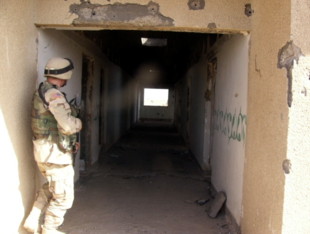 |
By
now, you should be wondering what relevance his being
gay could possibly have on his ability and courage to
serve his country and lead troops in combat.
 |
In
March of 2005, while he was back in Germany ready to
reenlist, he got word through friends that
organizers were seeking an active duty Purple Heart
recipient who was willing to come out publicly in
order to advocate the repeal of Don't Ask Don't
Tell. Believing in honesty and integrity above
all else, and encouraged by his heterosexual peers in
his unit who knew and respected his leadership, he
volunteered.
Hearing
Sgt. Stout tell me this gave me a creepy feeling,
setting off a memory echo from long ago. Over
thirty years earlier in 1974, my friend, Air Force SSG
Leonard Matlovich had heard a similar request. A
Vietnam War hero with 18 years' service, a Purple Heart
and Bronze Star, Matlovich didn't hesitate; he
volunteered, announced that he was gay and was
promptly dishonorably discharged. His case, the
first of many to follow, took ten years to prove a
point, that there is no reason why gay people cannot
serve honorably. Why is it still necessary,
three decades later, for heroic young men such as Sgt.
Stout, to have to fall on their swords and sacrifice
their careers in the ongoing battle against
bigotry? How many honest heroes will it take for
our nation to feel shame for dishonoring its most courageous
sons?
|
After
the news story hit the papers, there was quite a
hullabaloo radiating down from the Pentagon to his
unit command. Here was a hero who wanted to
reenlist, who happened to be openly gay. Oy vey,
what to do? As often as this has occurred it was
getting embarrassing for our government. His commander
didn't really want to discharge him; Sgt. Stout had
brought back his entire unit in one piece. Still,
rules are rules. He was not permitted to
reenlist. In due course, he was handed his
honorable discharge and he joined the ranks of highly
qualified leaders whom our armed forces have rejected
and ejected. Over 12,000 have been discharged
due to homosexuality in the 15 years of the DADT
policy. Additionally, each year 4000 (a full
brigade) senior NCOs simply do not reenlist, finding
it unbearable to go on serving in silence.
Robert
Stout returned to Ohio, not quite to a heroes welcome,
to spend some time in solitude to remember those he
served with who did not return; to his family and
friends.
"Why
did you go back there?" I asked.
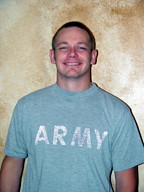 |
"Home
is the only place I know." He said, "I wanted to
go back to someplace familiar," after all the
shooting and explosions and war. Robert Stout
grew up on a farm; despite everything, he's a humble
quiet person.
Now
Sgt. Stout is rebuilding BRAVER, the Buckeye Region
American Veterans For Equal Rights chapter in Columbus,
Ohio. Founded by another courageous disabled
vet, Todd Shinkle, the chapter became inactive after
his death. |
According
to Sgt. Stout, "Returning home to Ohio was one of
hardest things I
have ever had to face. My native Ohio had ceased
to become home to me." While Sgt. Stout was training for his deployment to
Iraq in November of
2004, Ohio passed one of the broadest bans on same-sex marriage in the
nation. Even though he knew the climate of Ohio
had changed, Sgt. Stout
returned home. "I knew I was not going to
be welcomed, I understood that I
was now stripped of the rights I was sworn to protect,
but it was my home,"
Sgt. Stout said. Even after moving to Columbus,
Ohio, with his partner and
facing years of unemployment, hostility, and harassment,
Sgt. Stout never
considered abandoning his state.
Soon after returning, Sgt. Stout did find a place
where he was welcomed. BRAVER, the local chapter of American Veterans For
Equal Rights, had been working since 2003 to provide support
for veterans like him.
In the spring of 2008, Sgt. Stout saw the need for
BRAVER to return after it had become inactive for
several years. He
remembered the camaraderie and assistance that he was
given when returning
home. With more Veterans leaving the service and
coming home to face
challenges that were never anticipated, the need for
an organization not
only to honor our veterans' service but to provide for
them was overwhelming.
As the only Veteran Service Organization in Columbus
and Central Ohio for
the Gay, Lesbian, Bisexual and Transgendered (GLBT)
community, BRAVER is
working to give a voice to the over 6,000 estimated
GLBT Veterans of Central
Ohio.
Remembering the trials that he faced and that continue to
plague him, Sgt. Stout in Columbus has given new light to BRAVER. Working
to provide social support, access to benefits and even simple
employment are key
elements to its mission, BRAVER is now working to insure that
all veterans are treated with the honor and dignity that their selfless service
entitles them to, regardless of sexual orientation. "The
stigma placed on
being a veteran at this time in our history is hard enough to deal with. When
you add on the bigotry you are forced to face for being LGBT, it becomes
overwhelming at times. I never thought I would have to deal with these problems
coming out of both the closest and the military and I am thankful that BRAVER
was there to help me through it. And now it is my turn to help
other veterans in need," he said.
|
Robert
Stout has been awarded the following
medals and
ribbons for his service:
Purple Heart
Army Achievement Medal
(3rd Award)
Army Commendation Medal (2nd Award)
Global War on Terrorism Expeditionary Medal
Global War on
Terrorism Service Medal
Kosovo Campaign Medal (with Bronze Star)
Iraq
Campaign Medal
Army Service Ribbon
Overseas Service Ribbon
NATO Medal (Kosovo)
Army Good Conduct Medal
National Defense
Service Medal |
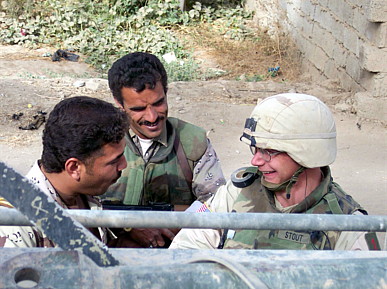
|
©
2008 Gay Military Signal
|